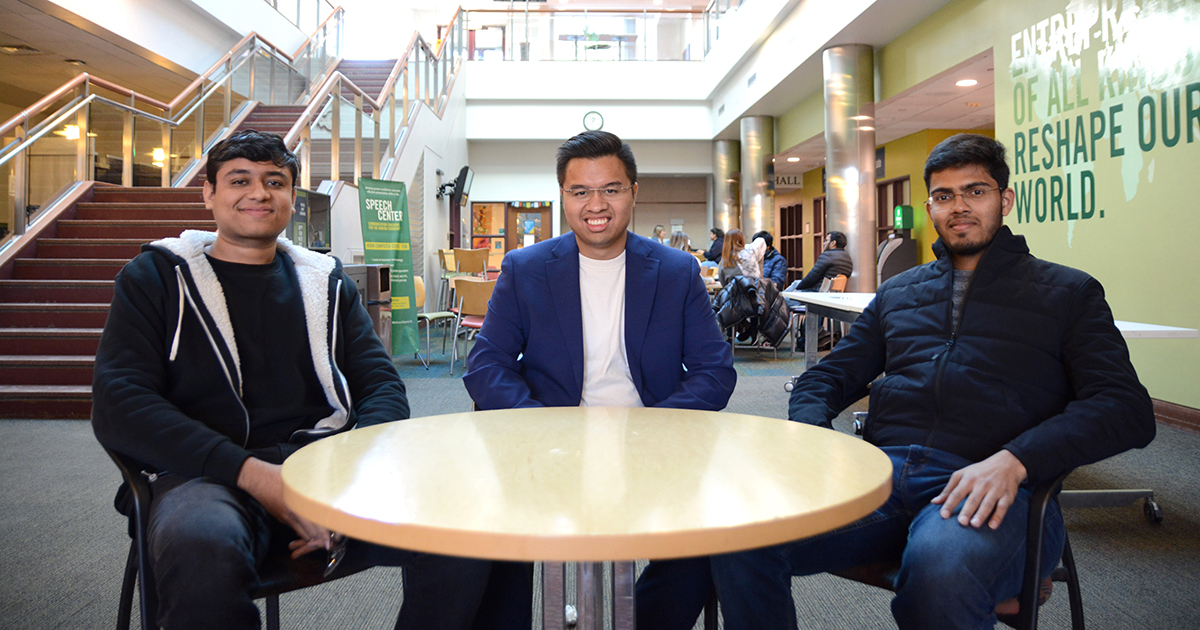Meet the MSEL’23 Students Serving Up Food Security

Omkar Vijayanand MSEL’23 was working at a McDonald’s in Reading, England, when he got his first glimpse of large-scale food waste—an encounter that sparked his current startup that uses new technology to produce fresh, healthy food while reducing food waste.
“It’s not really a secret that at McDonald’s, we’d have to keep throwing food away,” Vijayanand said. To ensure meals stay fresh at the fast food chain, unsold burgers had to be thrown away after 30 minutes. The trademarked Filet-O-Fish has to be tossed after 40 minutes, and the chicken filet sandwich is only good for an hour after being prepared.
Of course, the issue isn’t limited to McDonald’s. Food waste in the United States spikes during the holiday season, a time synonymous with abundance from Thanksgiving fixings to Christmas cookies. Discarded food contributes to an increase in household waste by more than 25% between Thanksgiving and New Year’s Day in America, according to the United States Department of Agriculture.
“All that waste just didn’t make sense to me, so I started to analyze the factors that affect food costs and look at the kinds of things we could use to reduce those costs,” Vijayanand said.
Enter minute kitchen—spelled using lowercase letters—a vending-machine startup that aims to provide a variety of delicious, healthy meals at an accessible price and location. A prototype, offering dishes like the Indian classic Chicken Biryani, will be available on campus in January.
Minute kitchen creators Vijayanand and his colleagues, Michael Hasibuan MSEL’23 and Nandish Thakkar MSEL’23, studied the local take-out market and potential fast food competitors like Dunkin’ Donuts and found two big factors responsible for high food costs.
“It turns out that 40 to 50 percent of food cost drivers come from labor and rent,” Hasibuan said. “To cut down on those costs, our solution was hot-food vending machines. You can order what you want to eat and in 60 seconds, you can have your food hot and fresh.”
Food Budget Busters
All three students behind minute kitchen have various food-industry experience and relied on that firsthand knowledge during the brainstorming process. Those close ties gave Vijayanand access to several emerging technologies, including one that’s vital to minute kitchen’s success—an oven that allows restaurants to cook a pizza in under seven minutes.

“Those are the sort of innovations happening in the field that we can take advantage of, and these recent innovations could add to the food industry ecosystem and make food more accessible,” Vijayanand said.
Hot food vending machines are thriving in places like the Netherlands and Japan, where they have rows of different foods conveniently available for busy people to grab and go. The service is piquing interest in the U.S., as take-out restaurants struggle with inflation costs and with finding and keeping employees.
Here in Massachusetts, Thakkar said, a recent study showed that food inflation forced 1.9 million people—36 percent of Massachusetts adults—to cut back on their food intake in 2022 because of surging costs.
“We’re able to cut down on rent, because the vending machine has a small footprint, and we’re cutting down on labor by making it automated,” said Hasibuan.
Those cost savings can then be passed on to the consumer, making the meal more affordable and available 24 hours a day.
A Fashionable Meal
So, what’s on the menu at these minute kitchens? To determine what the vending machine serves up, the team found inspiration in an unlikely location—fast fashion.
“Zara created their fast fashion business using very targeted information about their customers,” Hasibuan said, referencing a successful Spanish apparel retailer that has thousands of locations across the globe.
Offering cutting-edge fashion at a cut-rate price, a key aspect of Zara’s success is their competitive customer research capabilities which allows the store to deliver different styles in different regions.
“We’re going to make the food very targeted,” Hasibuan said. “We want to have a very data-driven approach and stock up on what users want.”
Feedback from Babson students, many of whom are international, has indicated they want food options from India, Indonesia, and other locations that offer a taste of home.
“All of this started the moment I stepped onto Babson’s campus. Babson provided a great ecosystem and atmosphere, they gave us all the resources, and all we had to do was just do it.”
Omkar Vijayanand MSEL'23
The trio already has connected with Chartwells Catering, Babson’s food service providers, and expect to install a minute kitchen prototype in Olin Hall as soon as January. Meanwhile, minute kitchen also is one of 12 businesses accepted to a 10-week acceleration program run by the graduate student-led Babson Acceleration Club. The businesses will compete in a pitch competition in mid-March, and the grand prize is $100,000.
Those types of opportunities, said all three students, are exactly why they chose to attend Babson. Vijayanand had long dreamed of creating something like minute kitchen since that McDonald’s job back in Reading, England, and it was Babson that afforded him the resources to do it.
“All of this started the moment I stepped onto Babson’s campus,” Vijayanand said. “Babson provided a great ecosystem and atmosphere, they gave us all the resources, and all we had to do was just do it.”
Posted in Community




